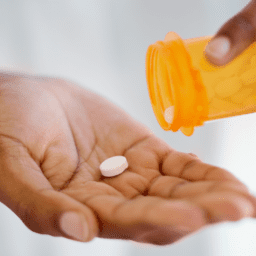Research into drug repurposing for Parkinson’s has been increasing rapidly since 2012, mainly due to the work of the International Linked Clinical Trials Initiative (iLCT), led by the Cure Parkinson’s Trust and Van Andel Institute. The iLCT initiative’s primary goal is to find medications approved for other conditions that may be disease-modifying when used to treat Parkinson’s.
Drug repurposing is when a medication approved to treat one condition is used to treat a different situation. Using medicines in this way before it is formally approved as a treatment for a new disease is called “off-label” use.
Aspirin is an example of a repurposed drug that is frequently used off-label. While aspirin is approved as a fever reducer and pain reliever, doctors often recommend it to help lower a person’s heart attack or stroke risk. One example of a repurposed drug that has been approved for an additional condition is a drug that you may be using as a treatment for Parkinson’s: amantadine was originally an anti-viral medication but has also been approved as a Parkinson’s therapy.
The iLCT has already been instrumental in advancing multiple repurposed medications into phase III clinical trials. These include ongoing exenatide trials in the United States and the United Kingdom, such as the recently announced ambroxol trial.
How Does the Drug Repurposing Process Start?
Sometimes, the process of repurposing a medication can start by accident. This was the case with amantadine: a person with Parkinson’s noticed that taking amantadine as an anti-viral therapy resulted in improvements in their Parkinson’s symptoms.
It is more common, however, for the process of repurposing a medication to begin when researchers notice that a medication approved for one condition affects a biological pathway associated with another state. The Cure Parkinson’s Trust’s iLCT website offers more information about selecting candidates for drug repurposing in Parkinson’s.
Advantages of Drug Repurposing
One advantage of repurposing an approved drug is that researchers already will have data about how the medication affects the body, so they will often have strong reasons to suspect it will be beneficial for a new purpose. Another benefit of drug repurposing is that there is sometimes more data that can be gleaned from the population already using the drug. For example, researchers found that people who took exenatide for diabetes had a lower incidence of Parkinson’s.
There are two other significant advantages to drug repurposing. One is that the clinical trial process is often faster for repurposed drugs than for new medications because there is already substantial safety data about the drug being repurposed. Additionally, the costs associated with repurposing a drug are often lower than those related to developing an entirely new drug.
The Necessity of Randomly Controlled Trials for Repurposed Drugs
The advantages of drug repurposing contribute to excitement when clinical trials are announced for treatments like exenatide and ambroxol that can offer a neuroprotective effect. The enthusiasm is understandable! Finding neuroprotective, disease-modifying therapies for Parkinson’s is unquestionably among the most critical unmet needs for the Parkinson’s community.
In the enthusiasm surrounding these trials, people sometimes explore the possibility of using the medications off-label outside of the clinical trial setting. While off-label use can be tempting, it can be both expensive and physically risky, so candidates for drug repurposing must be thoroughly researched in controlled clinical trials, where the safety of the people taking the medication can be carefully monitored, and data about efficacy can be collected and evaluated.
Why does this happen?
The formal clinical trial process is an essential step in repurposing medications for multiple reasons. First, even though repurposed drugs have an established safety history, there may still be unexpected effects, including those resulting from interactions with other medications. Additionally, sometimes, a dose that is effective for the medication’s original indication is not adequate for a new movement, and a well-designed clinical trial is the best way to determine the safest and most effective dose. Another reason is that there is a chance that the medication could provide only limited benefits or have no benefit at all for Parkinson’s.
Worse yet, it is even possible that a repurposed medication could have detrimental effects. A recent example of this is the trial of deferiprone as a treatment for Parkinson’s. Despite solid reasons to think it could have a neuroprotective effect, in the deferiprone clinical trial, the people who received deferiprone had worse outcomes than those who received a placebo. Another example is liraglutide, a drug that is similar to exenatide. A recent phase II trial of liraglutide reported mixed results: the treatment showed signs of improving non-motor symptoms but did not show signs of improving motor symptoms.
The Importance of Patience
Although the clinical trial process is often expedited for repurposed drugs, the process can still take multiple years, especially when disease modification is a possible outcome being investigated, and it can be challenging to have patience amidst the excitement about these promising treatments.
However, it is essential to remember that even though drug repurposing for Parkinson's has significant advantages, every new medication use should be backed by substantial data to ensure the efficacy and safety of the medication for the people who will take it.
Suppose you are considering taking a medication or other treatment off-label. In that case, you'll need to consult with your care team before doing so, and it is worth keeping in mind that a much safer way to access these medications would be to join a clinical trial. This will be safer for you, but the faster a problem reaches capacity, the quicker the test results will be available.
If you can’t or don’t want to join a trial, consider improving your diet, exploring new exercise methods, or increasing your social engagements. These are known ways to improve your quality of life while the drug repurposing clinical trial process continues.
Further Information
Repurposing Medications for Parkinson’s disease | APDA (apdaparkinson.org)
Michael J. Fox Foundation: Drug Repurposing Webinar
Parkinson’s Foundation: Drug Repurposing Podcast
No Silver Bullet and Dr. Foltynie: Does the Repurposing of Diabetes Drugs Offer Hope…
FDA: Understanding Unapproved Use of Approved Drugs “Off Label”
Science of Parkinson’s: The Ambroxol Results
Science of Parkinson’s: The Neuraly Trial
Cure Parkinson’s Trust: Ambroxol
Cure Parkinson’s Trust: Exenatide
WANT MORE PRACTICAL ARTICLES LIKE THIS?
You can learn much more about living well with Parkinson’s today through our Every Victory Counts® suite of resources. Each manual is packed with up-to-date information about everything Parkinson’s. Click the link below to reserve your manual(s).
















